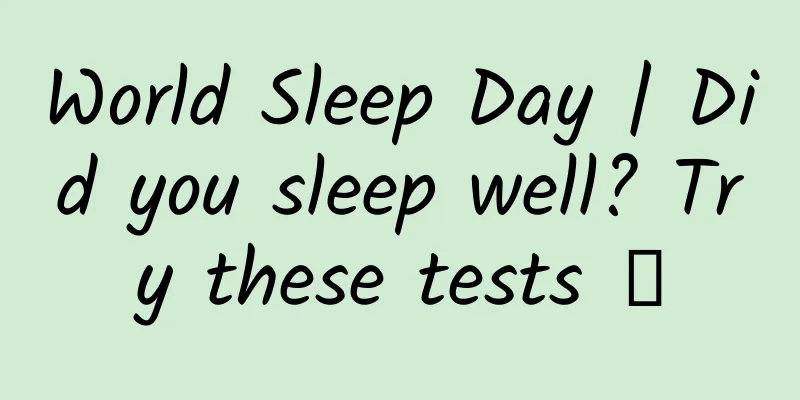World Sleep Day | Did you sleep well? Try these tests →

|
I can't help playing for a while at night, and I can't get up in the morning. Even if I go to bed early occasionally, I still feel very sleepy during the day. Did I sleep well? A few days ago, I read a book about sleep on a certain platform and found that in just a few hundred pages, there were several comments on almost every page and every paragraph, which shows that many people have sleep confusion. Today, taking advantage of World Sleep Day, let's find out: Do we really sleep well? Copyrighted stock images, reprinting may cause copyright disputes 01Why do we need to sleep? Sleep is a cyclical state of altered consciousness, divided into two stages: non-rapid eye movement (NREM) and rapid eye movement (REM) . NREM sleep includes two stages: light sleep and deep sleep , while dreams occur in the REM stage. These two stages cycle every 90 minutes, about 4 to 5 times a night, with deep sleep mostly concentrated in the first half of the night and REM sleep in the second half of the night . There is no optimal solution to this problem. But some people have discovered many benefits of sleep. Sleep is like the " deep cleanup + system upgrade " mode of a mobile phone. In this process, the brain has to sort out memory fragments and repair cell damage. Scientists have found that when we have a good sleep after learning new skills, the hippocampus will move the memory "package" from the "short-term warehouse" ( hippocampus ) to the long-term storage area ( cerebral cortex ) like a courier. This process can increase memory retention by about 40%. What's even more amazing is that during deep sleep, cerebrospinal fluid flushes the brain like a detergent, increasing the clearance rate of "neural garbage" such as beta-amyloid protein by about 60%. This is like giving the brain a deep SPA, which can effectively reduce the risk of Alzheimer's disease. At the same time, the body secretes growth hormone to repair muscles and tissues damaged during the day, so athletes need to sleep 1-2 hours more than ordinary people. Copyrighted stock images, reprinting may cause copyright disputes The REM sleep stage is more like a "creative workshop" for the brain. At this time, the eyeballs move rapidly, dreams occur frequently, and the brain randomly combines the information experienced during the day to form new creative connections. Studies have found that people who nap for 90 minutes are 35% more capable of solving complex problems than those who do not sleep. Interestingly, during this stage, the muscles will temporarily "shut down" to prevent us from putting the actions in our dreams into practice, avoiding embarrassing situations such as "jumping out of bed to chase dinosaurs" in the middle of the night. Modern research has confirmed that people who sleep 7-9 hours a day have a 15% lower risk of cardiovascular disease and a 30% lower risk of diabetes. But be aware that sleeping more than 9 hours may be counterproductive, just like overcharging a mobile phone can damage the battery. 02How can I sleep well? Want to turn sleep into an automatically renewed "membership service"? Try these methods: 1. Create a sleep wonderland The bedroom should be like an "ice cave" - a little cooler is more comfortable for sleeping! But remember not to freeze yourself too cold. Replace the curtains with blackout curtains, and add a white noise machine. Scientists have found that listening to sounds of a certain frequency (such as 432Hz) before going to bed can increase the duration of deep sleep by 20%. Don't use your mobile phone as a light bulb. Blue light can reduce melatonin production by 50%. Reading a paper book one hour before going to bed is like playing an old-fashioned film movie for your brain. Soaking your feet or taking a bath in hot water before going to bed can also help you sleep, because the drop in body temperature triggers the "sleep start button". Copyrighted stock images, reprinting may cause copyright disputes 2. Start the sleep program Go to bed and wake up at the same time every day, and don’t be lazy on weekends. Your body’s “alarm clock” is more accurate than your cell phone. 3.Scientific charging method During the day, you can absorb sunlight like a solar panel. Ten minutes of sun exposure every day is equivalent to winding up your biological clock. Don't have a Michelin feast for dinner. Exercise in the morning. People who run in the morning sleep 17% longer than those who run at night. 4. Give bonuses to body repair workers If you wake up in the middle of the night, don't worry! Try the "20-minute rule": get out of bed and fold clothes if you've been awake for more than 20 minutes, and wait until your eyelids start to droop before going back to bed. This will help you establish a conditioned reflex like training Pavlov's dogs. Copyrighted stock images, reprinting may cause copyright disputes Finally, if you really can’t sleep, don’t worry too much, taking a nap or making up for sleep during the day is also a good idea. The most important thing is not to let yourself fall into sleep anxiety. 03How do you know if you have slept well? Sleep has so many benefits, so how do you know if you have slept well? Generally speaking, if you fall asleep in less than 20 minutes, wake up less than twice at night and can fall asleep quickly, feel energetic in the morning, have high alertness during the day (such as driving without drowsiness), have stable emotions, and have normal memory and concentration, then you have slept well. Try these fun quizzes: 1. Waking up test If you jump up like a spring when the alarm goes off at 7 a.m. and can remember the details of your dream last night (such as dreaming that you were eating hot pot), congratulations! This means that you have enough REM sleep and your brain is processing emotions efficiently. On the contrary, if you struggle to get up as if you were bitten by a zombie, it means that you may need to "quickly recharge" your sleep. 2. Coffee dependence test Don't drink milk tea or coffee for three consecutive days, and observe whether you have withdrawal reactions such as hand tremors and headaches. If you can still work efficiently, it means that your natural wakefulness system is working well; if you feel that you will die if you don't drink coffee, you may need to check your sleep efficiency. Copyrighted stock images, reprinting may cause copyright disputes 3. Memory test Memorize 10 words before going to bed, and test how many you can remember the next morning. Under normal circumstances, deep sleep can increase memory retention by 40%. If you find that you can't even remember what you ate last night, it may be that the brain cleaning mode has not been successfully activated. 4. Emotional Roller Coaster Test Observe your reactions when you encounter traffic jams or mistakes at work during the day. People who get enough sleep can maintain a "wonderful world" mentality even when they encounter these bad things; those who don't get enough sleep may instantly turn into a "powder keg" and want to step on even an ant crawling by. 5. Physical Honesty Test Observe whether you have "eyelid fighting" at 2 pm. People with healthy sleep will be as energetic as sunflowers at this time, while those who are sleep deprived will be like robots that have been unplugged and may enter standby mode at any time. The latest research found that people who get good sleep will blink 20% less during the day because their eyes get enough rest. Next time, you can secretly count the number of times your colleagues blink, and you may find a hidden sleep expert! Note: These are all self-perception methods. If you feel you need more objective measurements, you can choose to monitor your sleep and physiological indicators with the assistance of a doctor, and use technological equipment to monitor and evaluate. Some advanced smart wearable devices have a very high accuracy rate in monitoring sleep. Author: Member of the China Science Writers Association Reviewer: Tang Qin, Deputy Secretary-General of the Expert Committee of the Chinese Medical Association, Senior Researcher, National Health Science Expert Jointly produced by: Science Popularization China × Chinese Medical Association References Why Do We Sleep? Matthew Walker, Beijing United Publishing Company, 2021 BBC,Seven ways to improve your sleep according to science,Seven ways to improve your sleep according to science 8 secrets to a good night's sleep, 8 secrets to a good night's sleep - Harvard Health How to Get Quality Sleep, How to Get Quality Sleep (with Pictures) - wikiHow Are you getting enough sleep?, Are you getting enough sleep? - Harvard Health How to Know If You Slept Well, How to Know If You Slept Well Sleep 101: Why Sleep Is So Important to Your Health, Sleep 101: Why Sleep Is So Important to Your Health | The Pursuit | University of Michigan School of Public Health | Adolescent Health | Child Health | Chronic Disease | Epidemic | Mental Health | Obesity |
Recommend
How to tell whether a turtle is wild or farmed? The difference between wild and farmed turtles
Turtle, also known as turtle, is often called &qu...
The pregnancy line is thicker on the bottom and thinner on the top
Stretch marks are a problem that bothers many peo...
Beware! Not only balance bikes, but also popular stress-relieving toys such as screaming chickens have been found to contain excessive levels of phthalates
Some time ago, CCTV News revealed that plasticize...
Will uterine contractions be painful after childbirth?
After giving birth, the uterus of a pregnant woma...
How to make multi-grain rice fragrant, soft and delicious? What are the techniques for making multi-grain rice?
We all know that there are many ways to eat rice....
What is a hitter when shooting a basketball? The correct hand shape for holding the ball in basketball
When playing basketball, it is common to encounte...
Should I squeeze out the swollen milk when I am weaning?
When breastfeeding women are weaning, they someti...
Mistakenly thought it was a cold, and almost lost my life! Don’t ignore these situations...
Have you ever had this experience when you had a ...
What to do if you have a cough and phlegm after a cesarean section
After cesarean section, many women will have coug...
What does a woman’s lower right eyelid twitching indicate?
Many people have experienced the twitching of the...
Polycystic menstruation has been continuous
Female friends are very likely to suffer from dis...
What to do if your menstruation lasts for 10 days
Menstrual health issues cannot be ignored, of cou...
Drinking tea incorrectly can harm your health! These 3 types of people should drink less
The habit of drinking tea It seems to be engraved...
What to do if the vulva turns black? How to improve the color of the vulva
The genitals are the most private part of women, ...


![[Medical Q&A] Can I use a Band-Aid as long as I have a wound?](/upload/images/67f0fe3760f09.webp)


![[Smart Farmers] When H1N1 influenza strikes, how should we respond?](/upload/images/67f1ba6128220.webp)



